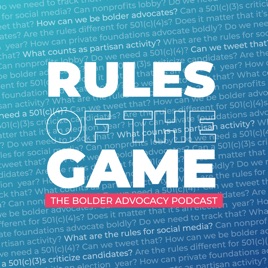
Advertise on podcast: Rules of the Game: The Bolder Advocacy Podcast
Rating
5 from
Country
This podcast has
100 episodes
Language
Publisher
Explicit
No
Date created
2020/08/12
Average duration
18 min.
Release period
15 days
Description
Nonprofits are important advocates on issues critical to every community, but sometimes the rules and regulations of advocacy can be barriers to entry. In Rules of the Game, Bolder Advocacy attorneys at Alliance for Justice use real examples to demystify these laws to help 501(c)(3) and 501(c)(4) nonprofits be bolder advocates, whether holding elected officials accountable, educating candidates, engaging voters, or lobbying for policy change.
Social media
Check Rules of the Game: The Bolder Advocacy Podcast social media presence
Podcast episodes
Check latest episodes from Rules of the Game: The Bolder Advocacy Podcast podcast
The Connection
2024/02/21
On this episode, we discuss The Connection, Bolder Advocacy’s go-to guide on how to create and operate 501(c)(3)s, 501(c)(4)s, and political organizations. In 2024, we release our 5th edition of The Connection and include several important updates your nonprofit needs to know about as we move into a contentious election season. If your nonprofit has questions about how to safely operate affiliated organizations or how to boost civic engagement in coalition with organizations that have a different tax-exempt status than your own, The Connection has the answers.
Attorneys for this show
Natalie Ossenfort, Sarah Efthymiou, and Susan Finkle-Sourlis
Show Notes
· The Connection is one of Bolder Advocacy’s core advocacy resources.
o It pairs well with:
§ “Being a Player” (guide to lobbying regulations for advocacy charities)
§ “The Rules of the Game” (guide to election-related activities for 501(c)(3)s)
o This is the go-to resource for organizations on how they can amplify their impact and build grassroots power by utilizing multiple types of tax-exempt entities to address social problems and pursue policy change.
o It discusses the best practices you need to know about when working with 501(c)(3)s, 501(c)(4)s, and PACs
o The Connection was first published in 1988 and is primarily authored by Holly Schadler at Trister, Ross, Schadler, and Gold (with contributions from several of her teammates and allies in the field)
o 5th Edition releasing end of February or early March 2024
· What can you find in THE CONNECTION?
o Details on several different types of tax-exempt organizations and the advocacy activities they can engage in
o The rules 501(c)(4)s need to know when lobbying and engaging in political activities
o Information on how to create and operate affiliated c3 and c4 organizations (including a step-by-step overview of c4 formation procedures)
o The rules governing PACs (including state PACs federal PACs and 527s)
o Sample cost sharing agreement, sample 501(c)(3) public charity to 501(c)(4) grant agreement, information on the Lobbying Disclosure Act, and more!
· What’s new in the 5th edition?
o Information on new FEC disclaimer requirements for “internet public communications”
o Social media guidance for affiliated 501(c)(3) and 501(c)(4) organizations
o Details on a recent FEC ruling impacting the use of disclaimers for text messaging
o Requirements for Super PACs and hybrid PACs (also known as Carey Committees)
· "The Connection” also contains several concrete examples to illustrate how the rules apply in real-world scenarios (utilizing fictional tax-exempt organizations, of course).
o These examples answer questions like:
§ What happens when a 501(c)(3) wants to make a grant to its affiliated 501(c)(4) for an educational research project?
§ What happens when a 501(c)(3) conducts a nonpartisan voter registration drive and wants its affiliated 501(c)(4) to have access to the list of registered voters? You’ll find out in “The Connection” that it can’t just give the list to its affiliated 501(c)(4) at no charge, but it could in some instances (when allowed under state law) sell its list at fair market value via an arms-length transaction.
§ And, what happens when a c4 publishes a monthly magazine on mission-related issues and then, in one edition of the magazine, decides to include an article about its candidate endorsements?
· There are examples of required disclaimers for independent expenditures and electioneering communications too.
o Brand new FEC regulations, published in January of this year, clarify what types of communications fall within the definition of “internet public communications” and what types of disclaimers are required when these communications expressly advocate
more
Grassroots Advocacy
2024/02/07
Exploring grassroots advocacy and the various activities that grassroots organizations can use to advance their mission and bring about positive policy change.
Attorneys for this Episode
Monika Graham
Natalie Ossenfort
Victor Rivera
Shownotes
Introduction
Issue Advocacy and Lobbying
Rallies, Town Halls, and Community Mobilization
Persuading Elected Officials
Advocacy Days and Lobbying
Ballot Measures and Elections
Commenting on Candidates and Campaigns
Get Out the Vote Campaigns
Spotlight: Grassroots Organizations
Resources and Conclusion
more
Nonpartisan Election Year Advocacy
2024/01/24
On this episode, we discuss best practices for 501(c)(3) public charities conducting advocacy and nonpartisan activities, like get out the vote or voter education activities during an election year. Election year is upon us and the presidential primaries and caucuses, and primaries for other elected offices are starting to take place and will continue through the November General election.
Attorneys for this show
Monika Graham, Susan Finkle-Sourlis, and Leslie Barnes
Show Notes
· May 501c3 public charities advocate in an election year? How can a public charity be involved in an election?
· Types of nonpartisan activities that a 501(c)(3) may conduct include:
o Educating voters and candidates on the issues that are important to the people/community the organization serves.
o Mobilizing voters and supporting democracy
o Hosting candidate debates and forums
o And much more
· What are the IRS regulations surrounding advocacy and democracy work
o IRS has held that supporting democracy is a charitable activity, 501(c)(3)s have a role to play in our elections!
o Activities must further the organization’s charitable mission
o Activities must remain nonpartisan, cannot support or opposition of candidates running for public office
· The Facts and Circumstances test to determine whether or not communications or activities are nonpartisan.
o The IRS applies a “facts and circumstances” analysis to determine whether a charity’s communication is conducted in a nonpartisan manner or is really a veiled attempt to support or oppose candidates.
o When the IRS says “support or opposition” of candidates, that prohibition is broader than the explicit act of giving money to a campaign or saying outright that you should vote or not vote for a candidate. It’s not a bright line rule.
o Analysis is required across the spectrum of risk. It is an assessment of the risk.
· Discussion of the elements of the Facts and Circumstances Test.
o Does the communication refer to a candidate or election?
o Timing, upcoming election or is there another event outside of the organization that happened?
o Organization is discussing its core issues? Or is it comparing the organization’s issues to a candidate’s position?
o Who are you talking to? Who is the audience? Who are you targeting?
o Do you have a track record of discussing the issue?
o Are you discussing a wedge issue? What is a wedge issue?
** The discussion of this topic is from the view of 501(c)(3) public charities. Other types of nonprofits, like 501(c)(4)s do have the ability to undertake partisan activities as a secondary purpose.
Resources
Rules of the Game – Guide to nonpartisan election related activities for 501(c)(3)s
Comparison of 501(c)(3) and 501(c)(4) Permissible Activities – Chart
Praising and Criticizing Incumbents - Factsheet
The Connection
more
Ballot Measure Insights
2024/01/10
On this edition, we're thrilled to welcome Emma Olson Sharkey from Elias Law Group, bringing her fresh perspective after successfully guiding clients to victory in the critical 2023 Ohio reproductive rights ballot measure fight. Emma will help shed light on the essential considerations for tax-exempt organizations before taking the plunge into a ballot measure campaign.
Attorneys for this Episode
Quyen Tu
Tim Mooney
Emma Olson Sharkey
Shownotes
· Introducing Emma
· Lessons from Ohio:
o Progressives can work together to protect fundamental rights – and can be successful, even in states where conservatives otherwise control the state.
o We are seeing conservatives attack the ballot measure process at every point in the process. We need to think about what we can do to bolster our efforts from the very beginning to defend against attacks.
·
· Ballot measure considerations Two major considerations: state campaign finance obligations and federal tax implications:
o State campaign finance rules:
§ Registration & reporting obligations
§ Is there already a main ballot measure committee?
§ Do you want to be an independent expenditure committee?
· Will you trigger registration or reporting by your planned activity?
o If so, will this include donor disclosure?
§ Disclaimer obligations (including those you might not have thought of) - both for entities themselves and top donors.
o Also, need to be careful about implicating federal campaign finance rules – even referencing federal candidates or parties in communications could create coordination issues and lead to inadvertent in-kind contributions.
§ Advocacy and education outside of registration/reporting requirements
· Typically, communications to the public on the general subject addressed by the ballot measure, which do not refer directly or indirectly to the ballot measure itself, will not be regulated by state campaign finance.
· However, state laws vary so you should check state and local law to confirm.
o Federal tax implications:
§ In general, for public charities, advocating for or against ballot measures will be considered “lobbying” under federal tax law; public charities can only do an “insubstantial” amount of lobbying.
· If the organization measures its lobbying under the 501(h) expenditure test, it will need to count work on a ballot measure as direct lobbying once a petition is circulated among voters for signatures.
· If the organization measures its lobbying under the insubstantial part test, the IRS has provided less clarity; generally “influencing legislation.”
· Communications to the public on the general subject addressed by the ballot measure, which do not refer directly or indirectly to the ballot measure itself, will generally not be considered lobbying.
§ Since 501(c)(3) organizations can only do an “insubstantial” amount of lobbying, many entities that engage in ballot measure work are organized as 501(c)(4) organizations, which can do unlimited lobbying under federal tax law. Also considered “primary purpose” activity.
Resources
· Bolder Advocacy Ballot Measure Toolkit
· Seize the Initiative
Foundations and Ballot Measures 501(c)(3) Public Charities and Ballot Measures Ballot Measure Case Studies Ballot Measures and Public Charities: Yes, You Can Influence That Vote Initiating Policy Change: Circulating Ballot Initiatives in California Ballot Measures and Recalls: Basic Rules for 501(c)(3) Public Charities, 501(c)(4)s, and Unions Ballot Measure Legal Documents and Resources Ballot Initiative Strategy Center National Conference of State Legislators: State Resources
more
Nonprofit New Year's Resolutions
2023/12/27
On this episode, we’re going to talk about those pesky new year’s resolutions… and no, we’re not talking about signing up for a gym membership or signing up for a marathon. We’re talking about resolutions that nonprofit organizations can apply as we enter into the year 2024. As you all know, 2024 is like Stefon from SNL, it has everything…primaries, general elections, an additional day… So as you are headed for your holiday break, we wanted to leave you with a list of things your nonprofit organization can do as we head into the new year.
AFJ Team Members on this Episode:
Natalie Ossenfort
Monika Graham
Victor Rivera
On this Episode:
Top ten things your nonprofit organization can do to maximize its advocacy in 2024: [drumroll]
Host an elections training for staff ahead of the 2024 primaries and general election.
Remember that while 501(c)(3)s are not permitted to support or oppose candidates for public office, they CAN engage in nonpartisan election-related activities.
Bolder Advocacy can help you navigate the do’s and don’ts with an elections workshop. Request a private workshop through our website or check out one of our many 2024 public webinars.
Consider organizing a GOTV campaign or voter registration drive.
Check voter registration deadlines that apply to primaries and general election.
Brush up on your state’s voter engagement and registration laws. Check out our Practical Guidance – Voter Assistance series, created in partnership with The Democracy Capacity Project.
Remember that all 501(c)(3) voter registration efforts must be nonpartisan.
Prepare staff and volunteers to NOT answer the question: “Who should I vote for?”
Offer services to all.
Avoid partisan targeting.
Invite members of your coalition to participate in a voter education campaign, which could include a nonpartisan candidate questionnaire and/or voter guide. Guidelines for creating 501(c)(3) safe candidate questionnaires and voter guides include:
Use unbiased, open-ended questions (distributed to ALL candidates).
Cover a broad range of issues. You’ll also want to avoid comparing your organization’s position on an issue to where candidates stand.
Publish all responses impartially and equally (with no editing or variations in font, formatting, etc.), and make the final guide generally available to the public.
Remember NOT to include candidate pledges.
Also, do not coordinate with candidates and campaigns.
Just remember, facts and circumstances matter, so consult with Counsel if you have any questions regarding your specific voter education activities.
Organize events inviting public officials to speak during election season. Remember to make the distinction between a candidate appearance and an incumbent appearance.
Candidate appearances: must invite all viable candidates, avoid expressing support or opposition for candidate, do not allow candidate fundraising, and ensure compliance with state and federal election laws.
Policymaker appearances (in official capacity, unrelated to candidacy): No equal opportunity required, but make sure you’re working with official staff (not campaign staff) and that you reiterate to the incumbent and their staff in writing that you are a 501(c)(3) that is not allowed to support or oppose candidates. Incumbents who are also candidates should not mention their candidacy at your event. And you should also avoid speaking to their upcoming election and focus, instead, on their official acts as policymakers.
If you are a 501c4, consider making independent expenditures or coming up with a list of endorsements.
501(c)(4)s can engage in partisan political activity as a secondary activity of the organization, but they are prohibited from making candidate contributions and coordinating activities with federal candidates and campaigns (under federal election law) and are oftentimes subject to
more
Firewalls & Programmatic Independence
2023/12/13
On this episode, we discuss best practices for working in coalition and with affiliated organizations and the importance of firewalls to 501(c)(4)s that engage in independent expenditures.
Attorneys for this show
Monika Graham, Susan Finkle-Sourlis, and Leslie Barnes
Working in Coalition – Affiliated Organizations
· Maximize advocacy and resources
· 501(c)(3) and 501(c)(4) activities
· Establishing legal, financial, and programmatic independence
o Separate names, logos, EIN, and activities
o Cost sharing agreements
o Separate or joint websites and social media accounts
o Timesheets
o Branding matters
Firewalls – 501(c)(4)s and political organizations, candidates and committees
· What are independent expenditures?
· Why are independent expenditures important?
· Establishing firewalls to protect against impermissible coordination
· Safe harbors for permissible communications
· FEC firewall policy
Resources
Please check out the resources listed below and our extensive resource library at bolderadvocacy.org for more information on this topic. We hope you join us on a future episode of the podcast!
The Connection
The Practical Implications of Affiliated Organizations
Nonprofits Working Together
Working Together: Affiliation and Coalition Basics
FEC guidance on independent expenditures and firewalls
more
Advocacy Successes 2023
2023/11/29
On this episode we’re excited to highlight nonprofit success stories from around the country. While we talk about lobbying on this podcast, legislative wins are one type of advocacy victory. We’ll look at some legislative victories as well as other types of advocacy such as relationship building, corporate advocacy, and funding wins. For some organizations, legislative victories can bring additional resources to your community. For other organizations, legislative victories can serve as harm reduction in the interim while we build a multi-racial democracy. We’ll also highlight strategies for talking about advocacy success to your donors and community.
Lawyers for this episode
Leslie Barnes
Sarah Efthymiou
Ballot Measure Victories
· Ohio Issue 1
o Double digit victory
o Intersectional coalition work of grassroots organizations
o Ohioans for Reproductive Freedom was one coalition of community-led nonprofits ranging from faith-based organizations, to racial justice and transgender rights nonprofits, from labor organizations to trade associations.
· Other states that led the way on democracy-related measures Ballot measure recap by Victor Rivera Labiosa
California Legislative Victories – “Hot Labor Summer”
· SB 616, paid sick leave
o CA Work & Family Coalition, a coalition of community nonprofits
o Part of the coalition’s strategy involved gathering variety of voices to be heard by collecting stories and bringing those voices to the policy makers.
· SB 525, minimum wage increase to $25/hour for CA’s lowest-paid health care workers
o SEIU United Healthcare Workers West
Organizing Victories – Equitable compensation
· Black Leadership Action Coalition of Kentucky (BLACK) and Advocacy Based on Lived Experience (ABLE) 2 grassroots organizations
· Adopted policies that center impacted community members in their work by compensating directly impacted volunteers for contributing their lived experiences and community organizing skills.
· See guest blog below in shownotes
Strategies for talking to funders
· Follow your funder’s lead
· Investing in Change for other metrics to measure success
· Don’t take credit candidate victories
Resources
· Ballot Initiative Strategy Center – Ballot measure hub tracking challenges to direct democracy, past and upcoming ballot measures
· Democracy in Action: Analyzing November’s Key Ballot Measure Wins
· Two-part piece on Equitable Compensation Alicia Hurle
o The Power of Equitable Compensation in Community Organizing Spaces
o Building Community Empowerment
more
Foundation Funding Tips for Public Charities
2023/11/15
On this episode, we’re going to talk about funding… More specifically, how your nonprofit can raise dollars from private and public foundations to support your advocacy work. We’re joined on this episode by Emily Harting, AFJ’s Director of Foundation Relations.
AFJ Team Members on This Episode:
Emily Harting, Natalie Ossenfort, Victor Rivera
Introducing Emily Harting
Tips for Groups Working to Identify Potential Foundation Partners:
Start with path of least resistance – review foundation websites.
Find out who funds your organization’s allies (groups whose work you admire).
Connect with board members to assess their networks and seek out their advice.
Review your organization’s history of foundation funding and consider reapproaching former funders.
Other Avenues for Foundation Research:
ProPublica (free access)
Instrumentl
Candid
Foundation Outreach Recommendations:
Make the job of the foundation program officer as easy as possible. Show them clearly and succinctly the connection between the foundation’s priorities and the work of your organization.
It’s always best to use a connection if you have one (i.e. board member or ally).
Send an email introduction explaining your organization and how you think it aligns with the funder’s priorities.
If your organization issued a report, is in the news, or is hosting an upcoming event, you can use that to prompt outreach to a potential funder.
Best Practices When Preparing for a Meeting with a Potential Foundation Partner:
Brief your staff, internal participants.
Create a “POP” Agenda.
Purpose (of meeting)
Outcome (desired results)
Process (rough outline of who speaks when and about what)
If it’s an in-person meeting, plan to have some organizational materials ready.
If possible, also have resources ready to send following the meeting to continue to build communication/relationship.
Proposal Process:
Understand foundation proposal guidelines and preferred templates (if any).
If they don’t have a template or provide guidelines, best to build a general template including:
Intro paragraph with funding request ($$ and purpose: program/GOS);
A brief overview of who your organization is and its history;
A description of your programs and recent work you’ve done;
Conclusion reinforcing your request.
Connect your work to the foundation’s mission to demonstrate shared priorities.
Write clearly.
If the foundation has a proposal submission portal, submit your application early in technical issues arise.
Be prepared to provide a budget, proof of your 501(c)(3) status, recent audited financial statements or 990s, a board list with affiliation, a staff list, etc.
What About General Operating Support (GOS)?
Funders usually start with a project grant, but some will give GOS outright.
Remember to keep the funder up-to-date on progress throughout the grant period and share work products (resources or reports, videos, testimonials etc).
Report on the grant as requested, when requested, and with the materials requested.
Your nonprofit is more likely to receive GOS after you have built a trust-based relationship with your funder.
Other Practical Tips:
Remember that both you and the funder are hoping your organization is a match: they want their funds to support great work!
Program officers are people. You’ll achieve the best results when you have a trusted relationship with each other.
Ask your program officers for advice and thoughts on your strategy and programs.
Don’t be afraid of your funder. If you run into a challenge, tell them. The
more
PAC Taxonomy
2023/11/01
On this edition, we revisit PACs by talking about three different categories you run into every election cycle. What makes a Super PAC super? What can a traditional PAC do? And will the IRS revoke your tax-exempt status if your charity has to register or form a ballot measure PAC? We’re delving into PAC taxonomy to answer these questions today!
Lawyers for this episode
Tim Mooney
Susan Finkle Sourlis
Quyen Tu
Shownotes
Defining the various types of PACs. We came up with two approaches.
1. What activity you want to undertake?
2. What kind of money you want to raise and in what amount?
What is your priority? If you want the most freedom in activities, then there are more restrictions on fundraising or vice versa.
We’re covering three types of PACs:
1. Super PACs sometimes called IE PACs
2. Traditional PACs (could be state or federal)
3. Ballot Measure PACs
Resources
Seize the Initiative: A Legal Guide on Ballot Measures for Nonprofits and Foundations
Ballot Measures and Recalls: Basic Rules for 501(c)(3) Public Charities, 501(c)(4)s, and Unions
501(c)(3) Public Charities and Ballot Measures
Ballot Measures Toolkit (compilation of resources)
Nonprofit Requirements for California Ballot Measures (flow chart)
Ballot Initiatives: How Nonprofits Can Stand Up for Direct Democracy (blog)
A New Future for Reproductive Rights: Ohio’s Critical Elections (blog)
Nonprofit Coalition Helps Extend Health Insurance Coverage to 90,000 Nebraskans (blog)
Ballot Measure Committees: Campaign and Registration Requirements (California Secretary of State)
What is a California Ballot Measure Committee? (from the Fair Political Practices Commission)
more
Project Grant Rule
2023/10/18
On this episode we explore ways foundations can support civic engagement projects, including lobbying. Many listeners may be familiar with general operating grants, but today we’re joined by an expert to share with us a secret weapon called the project grant rule, what it is, how it works, and who can benefit.
It is our honor to be joined by Abby Levine who is associate general counsel for the Robert Wood Johnson Foundation. If Abby’s name sounds familiar, she was Bolder Advocacy’s Director for over a decade, and we are thrilled she’s agreed to join us.
1. What is unique about project grants?
2. Why did the Robert Wood Johnson Foundation and Bolder Advocacy partner to create the Project Grant Rule Hub for foundation and projects of public charities?
3. What resources will visitors find at the Project Grant Rule Hub?
4. Can project grant dollars really be used by projects for legislative campaigns and lobbying?
5. Are there any tips you can share about using the Project Grant Rule for foundations?
6. What tips do you have for grantees who receive a project grant?
Resources
Project Grant Rule Hub
Videos
Explainer videos on the project grant rule in English
En español: ¿Qué es el Project Grant Rule?n
For Foundations – How to Use the Project Grant Rule
For Grantees – How to Use the Project Grant Rule
Written Resources
The Project Grant Rule
Budget Template Instructions
Project Grant Rule Budget Templates
more
Ask Us Anything
2023/10/04
On this episode, it’s another round of your questions on all things advocacy! This time we tackle sign-on letters and election activity.
Attorneys for this Episode
Monika Graham
Tim Mooney
Victor Rivera
Shownotes
Sign-On Letters
We are currently working on a sign-on letter to build a wide coalition of supporters for a bill. Our goal is to have 500 partners sign on and for it to be sent to legislators and ask them to pass a certain piece of legislation. So it is indeed lobbying. The question for you is, are foundations allowed to sign on to such letters?
Praising and Criticizing Incumbents
In connection with issue advocacy, an organization may want to praise or criticize an elected public official for their actions, regardless of whether or not the official is also a candidate in an upcoming election. Is it OK to comment on the actions of elected officials if they are also candidates in an upcoming election?
Organizing a Candidate Debate or Forum
An organization is interested in organizing a candidate debate for a local race. Do we have to invite all candidates? What if only candidates from one party accept the invitation?
Is Nonpartisan Voting Information Now Partisan?
Early voting is starting in Virginia, and we wanted to make sure our community knows about it. But whether it’s early voting at the polls or vote by mail, it feels like this has become a partisan issue in the last few years. Is it ok for a 501(c)(3) to give out this information?
Resources
Bolder Advocacy Focus on Foundations Hosting Candidate Debates: Public Charities Can Educate the Community Through Candidate Debates Candidate Debates and Forum podcast episode Candidate Education factsheet
more
Funding Voter Registration
2023/09/20
On this episode, continuing our celebration of yesterday's national voter registration day we're revisiting a segment of our foundation myth busting episode all about funding nonpartisan voter registration drives.
Lawyers for this episode
Tim Mooney
Natalie Ossenfort
Jen Powis
Shownotes
MISCONCEPTION: Foundations can’t fund public charity voter registration drives
· Both private and public foundations can fund the NONPARTISAN voter registration activities of public charities, but the rules for private foundations can be a bit complicated...
· VR Drive must be nonpartisan, over multiple election cycles, in five or more states and cannot be subject to conditions requiring use of the funding in a specific state or election cycle.
· There are also requirements related to the grantee’s finances (e.g. at least 85% of organization’s income must be spent on activities relating to the purposes for which it was organized)
· Public charities can receive an advanced ruling from IRS certifying their ability to receive private foundation voter registration grants (confirms that organization meets the requirements of sec. 4945(f) of tax code)
Resources
Foundation Advocacy Grants: What Grantees Need to Know
Investing in Change: A Funder’s Guide to Supporting Advocacy
This segment was originally podcast June 23, 2021.
more
Podcast reviews
Read Rules of the Game: The Bolder Advocacy Podcast podcast reviews
LGM Austin
2022/07/06
Please go on Colbert or Trevor Noah to discuss DD
Please get direct democracy out to the public as a way to solve the Left vs Right stalemate. Abortion and Gun Safety will pass w The Peoples vote. Pl...
more
Elevating Voices
2020/09/09
Are you ready to be heard?
I work for a nonprofit organization and we have used Bolder Advocacy's materials for years. I still learn something new every single time I hear them ...
more
kellytaft2020
2020/08/20
Great information!
Thank you for doing this podcast! This information is super helpful.
Podcast sponsorship advertising
Start advertising on Rules of the Game: The Bolder Advocacy Podcast & sponsor relevant audience podcasts
You may also like these non-profit Podcasts
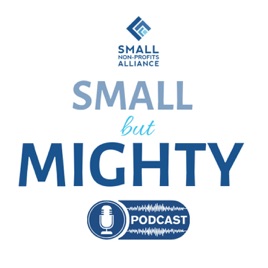
5
1
53
Small But Mighty Podcast for Non-Profits
Small Non-Profits Alliance podcast for small charities
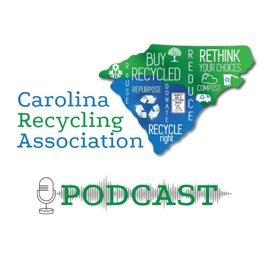
5
7
14
Carolina Recycling Podcast
Carolina Recycling Association

4.4
49
18
خيرك لاحق
Mics | مايكس

5
8
163
RaceFFpod
jaime garcia
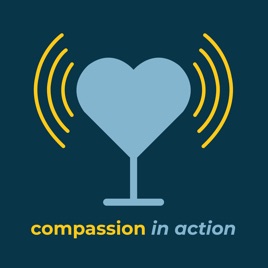
4.9
23
34
Compassion In Action
Compassion Prison Project
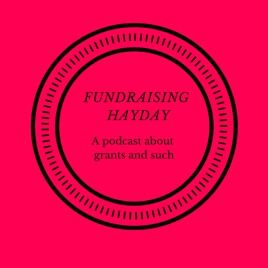
5
36
125
Fundraising HayDay
fundraisinghayday
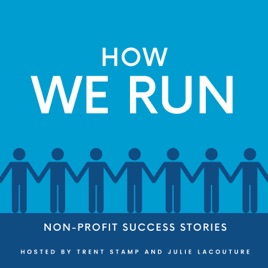
4.2
34
34
How We Run: Tips and Tales of Non-Profit Success
Good Ways Inc
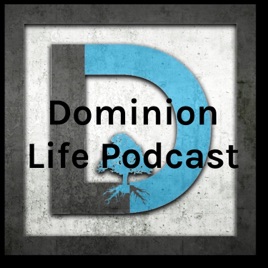
5
7
50
Dominion Life Podcast
Dominion Life Church
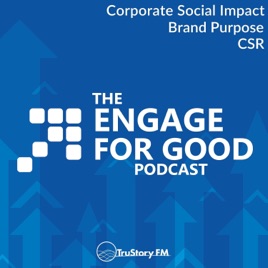
4.8
21
490
The Engage For Good Podcast with Alli Murphy
TruStory FM
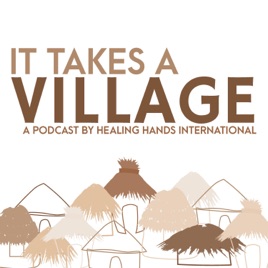
5
9
19
It Takes A Village
Healing Hands International



